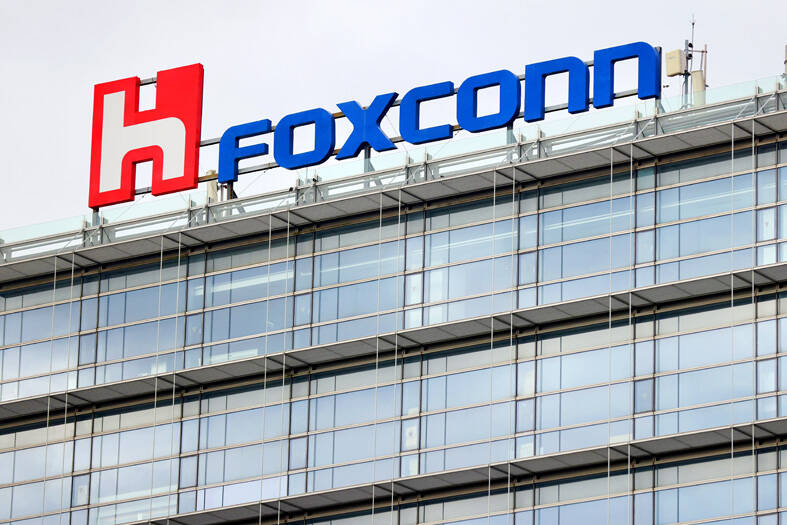Hon Hai Precision Industry Co’s (鴻海精密) consolidated sales slid last month, reflecting uncertainty in its business after Beijing launched an investigation into the world’s biggest iPhone assembler.
Apple Inc’s most important partner, also known as Foxconn Technology Group (富士康科技集團), reported a 4.56 percent year-on-year decline in revenue to NT$741.2 billion (US$23 billion) last month, the company said in a statement.
On a monthly basis, revenue rose 12.2 percent, which analysts attributed to the global sales of the iPhone 15 series from Apple Inc.

Photo: Ritchie B. Tongo, EPA-EFE
Hon Hai is also sticking with a “significant growth outlook” for the December quarter, which is typically the company’s busiest because of year-end iPhone shipments. Apple’s latest iPhone 15 hit store shelves in September.
“Operations will ramp up sequentially,” the company said in the statement, without elaborating.
Cumulative revenue in the first 10 months of the year totaled NT$5.05 trillion, a decrease of 7.21 percent from NT$5.44 trillion a year earlier, Hon Hai said.
Analysts said the decline reflected the effect of weakening worldwide demand amid a slowing global economy.
The investigation in China complicates Apple’s position in its largest international market and production base. Regulators there are conducting tax audits and reviewing land use by Hon Hai, state media said on Oct. 22.
The company has said it will cooperate with authorities, but shares of the company and its mainland-listed unit, Foxconn Industrial Internet Co (富士康工業互聯網), have tumbled on the news of the probe, shedding about US$9 billion of value at one point.
Separately, smartphone camera lens maker Largan Precision Co (大立光) yesterday reported that its consolidated sales last month rose 14 percent month-on-month to NT$6.33 billion (US$195.96 million), which marks a 47-month high.
Last month’s revenue increased for the fifth consecutive month and was the highest monthly amount since November 2019, the company said in a statement.
Last month’s revenue was 22 percent higher than the figure posted in the same month last year, the company said.
However, in the first 10 months, Largan’s consolidated sales fell 3 percent from a year earlier to nearly NT$37.29 billion, following weakening global demand for smartphones amid high inflation and interest rate hikes, the company said.
Last month, lenses for 20 megapixel-plus cameras — which have a higher profit margin — comprised 20 to 30 percent of Largan’s total sales, while lenses for 10 to 20 megapixel cameras comprised 50 to 60 percent of its shipments.
Lenses for 8 megapixel cameras accounted for 0-10 percent, and products other than camera lenses made up the remaining 10-20 percent, the company said.
Largan chief executive officer Adam Lin (林恩平) said that due to seasonal effects and increasing orders following the launch of new smartphones, the lensmaker experienced soaring sales last month compared with the previous month and that the momentum was expected to continue into this month.

GROWING OWINGS: While Luxembourg and China swapped the top three spots, the US continued to be the largest exposure for Taiwan for the 41st consecutive quarter The US remained the largest debtor nation to Taiwan’s banking sector for the 41st consecutive quarter at the end of September, after local banks’ exposure to the US market rose more than 2 percent from three months earlier, the central bank said. Exposure to the US increased to US$198.896 billion, up US$4.026 billion, or 2.07 percent, from US$194.87 billion in the previous quarter, data released by the central bank showed on Friday. Of the increase, about US$1.4 billion came from banks’ investments in securitized products and interbank loans in the US, while another US$2.6 billion stemmed from trust assets, including mutual funds,

Micron Memory Taiwan Co (台灣美光), a subsidiary of US memorychip maker Micron Technology Inc, has been granted a NT$4.7 billion (US$149.5 million) subsidy under the Ministry of Economic Affairs A+ Corporate Innovation and R&D Enhancement program, the ministry said yesterday. The US memorychip maker’s program aims to back the development of high-performance and high-bandwidth memory chips with a total budget of NT$11.75 billion, the ministry said. Aside from the government funding, Micron is to inject the remaining investment of NT$7.06 billion as the company applied to participate the government’s Global Innovation Partnership Program to deepen technology cooperation, a ministry official told the

Taiwan Semiconductor Manufacturing Co (TSMC, 台積電), the world’s leading advanced chipmaker, officially began volume production of its 2-nanometer chips in the fourth quarter of this year, according to a recent update on the company’s Web site. The low-key announcement confirms that TSMC, the go-to chipmaker for artificial intelligence (AI) hardware providers Nvidia Corp and iPhone maker Apple Inc, met its original roadmap for the next-generation technology. Production is currently centered at Fab 22 in Kaohsiung, utilizing the company’s first-generation nanosheet transistor technology. The new architecture achieves “full-node strides in performance and power consumption,” TSMC said. The company described the 2nm process as

POTENTIAL demand: Tesla’s chance of reclaiming its leadership in EVs seems uncertain, but breakthrough in full self-driving could help boost sales, an analyst said Chinese auto giant BYD Co (比亞迪) is poised to surpass Tesla Inc as the world’s biggest electric vehicle (EV) company in annual sales. The two groups are expected to soon publish their final figures for this year, and based on sales data so far this year, there is almost no chance the US company led by CEO Elon Musk would retain its leadership position. As of the end of last month, BYD, which also produces hybrid vehicles, had sold 2.07 million EVs. Tesla, for its part, had sold 1.22 million by the end of September. Tesla’s September figures included a one-time boost in